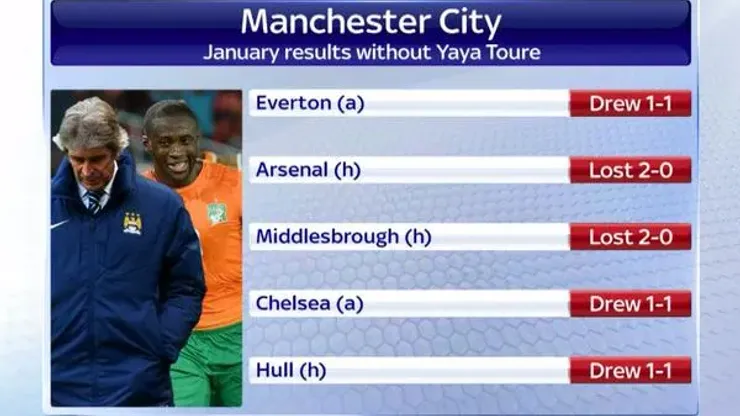For the third time in four seasons, Manchester City has experienced a decline in results during the months of January and February. Not so coincidently, these January/February plummets have occurred when Yaya Toure has been away on Africa Cup of Nations duty.
Regardless of whatever statistics are cited by supporters of Manchester City, the reality is that the club — despite an outlay of nearly £1 billion on players — is overly reliant on Toure. The Ivorian is a one-of-a-kind player in world soccer who can serve as a powerful auxiliary attacker but also as a holding midfielder or defensive cover. His mere presence on the pitch clears space for the Blues more creative players like David Silva and Samir Nasri.
During the 2011/12 season, the Blues went from a relatively comfortable lead in the Premier League table to chasing Manchester United due to a dip in form during Toure’s absence. This period also saw City eliminated from both domestic cup competitions.
While City’s greatest moment of triumph was the two stoppage time goals against QPR to win the 2011/12 Premier League title, it happened with Toure not on the pitch. Relegation-threatened Rangers taking the lead in that match can be directly attributed to the Ivorian’s absence.
A season later, Manchester City was still within a relatively manageable four points of Manchester United when Toure left for Africa Cup of Nations duty. However, by the time he returned, the Blues were twelve points back and completely out of the title picture.
This season when Toure left for the AFCON, helping lead Cote d’Ivoire to the title, City was joint top with Chelsea. Since the midfielder left, the Blues are winless in five matches, having been eliminated from the FA Cup by Championship side Middlesbrough and sit seven points behind Chelsea.
For the duration of Toure’s tenure at the Manchester club, even with the expensively assembled array of talent around the side, I have observed a lack of belief when he is not on the pitch. The never-say-die attitude which the Blues have so often exhibited with Toure on the pitch seems to be severely lacking when he is not present. The one exception would be the QPR match in 2012, but again the situation City found itself in that day was largely due to Toure’s withdrawal at halftime through an injury.
For a club that has spent so much cash, the lack of sheer desire and belief is not acceptable. The results without Toure are not acceptable and the failure for either Roberto Mancini or Manuel Pellegrini to figure out an effective way to play with him is not acceptable.
All the analysis about Manchester City’s failings are good fodder for discussion. But the side’s failure boils down to a simple fact that since 2010 the club has had a truly unique figure in the game and has very little concept of how to effectively play without him on the pitch. That is a managerial failure, a backroom failure and ultimately a club failure.
Yaya Toure will turn 32 in May and unlike many of his teammates, he has not extended his contract. Blues fans may get annoyed with his public statements and the eccentric behavior of his agent representation, but it is obvious over the course of time that Manchester City are not a title contender or perhaps even top four material without the classy Ivorian.
200+ Channels With Sports & News
- Starting price: $33/mo. for fubo Latino Package
- Watch Premier League, Women’s World Cup, Euro 2024 & Gold Cup
The New Home of MLS
- Price: $14.99/mo. for MLS Season Pass
- Watch every MLS game including playoffs & Leagues Cup
Many Sports & ESPN Originals
- Price: $10.99/mo. (or get ESPN+, Hulu & Disney+ for $14.99/mo.)
- Features Bundesliga, LaLiga, Championship, & FA Cup
2,000+ soccer games per year
- Price: $5.99/mo
- Features Champions League, Serie A, Europa League & Brasileirāo
175 Premier League Games & PL TV
- Starting price: $5.99/mo. for Peacock Premium
- Watch 175 exclusive EPL games per season






